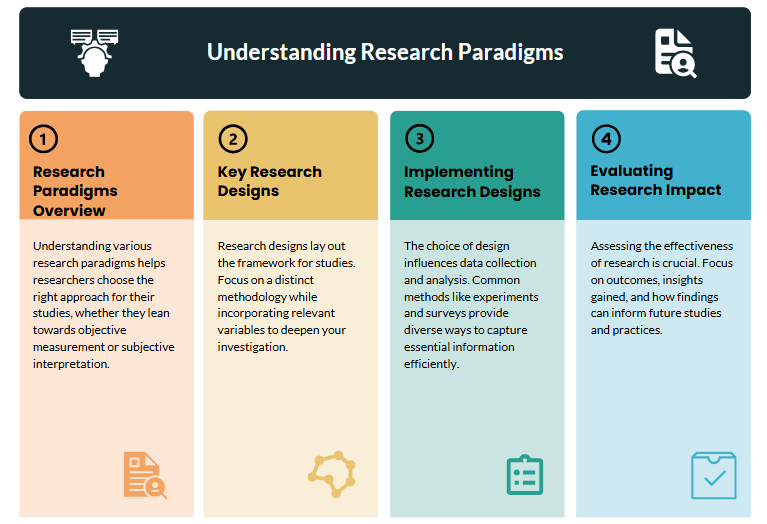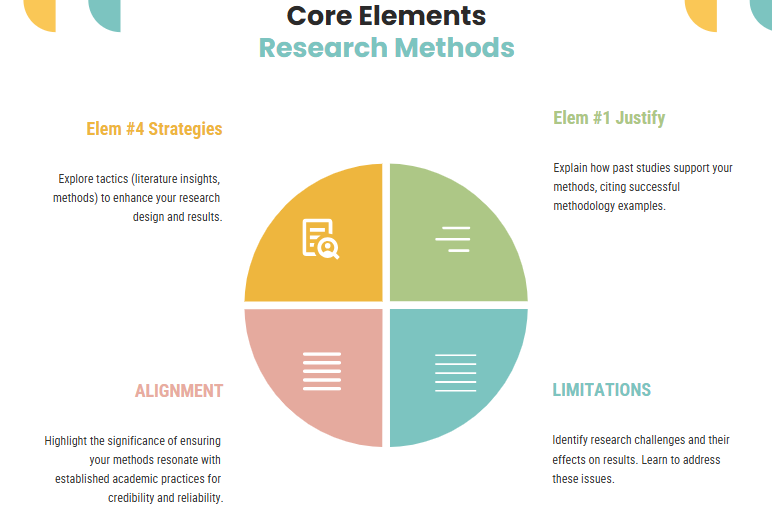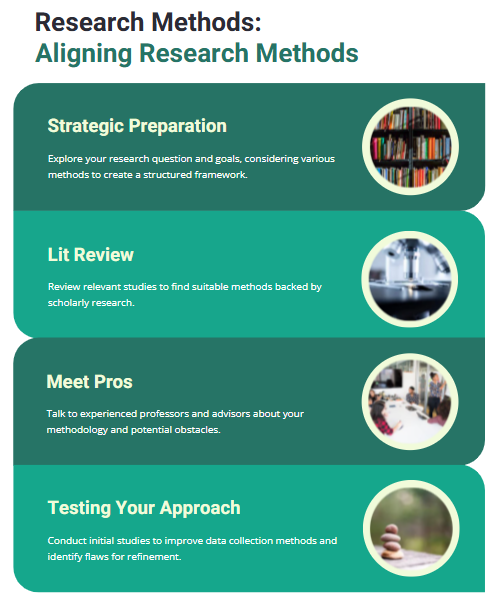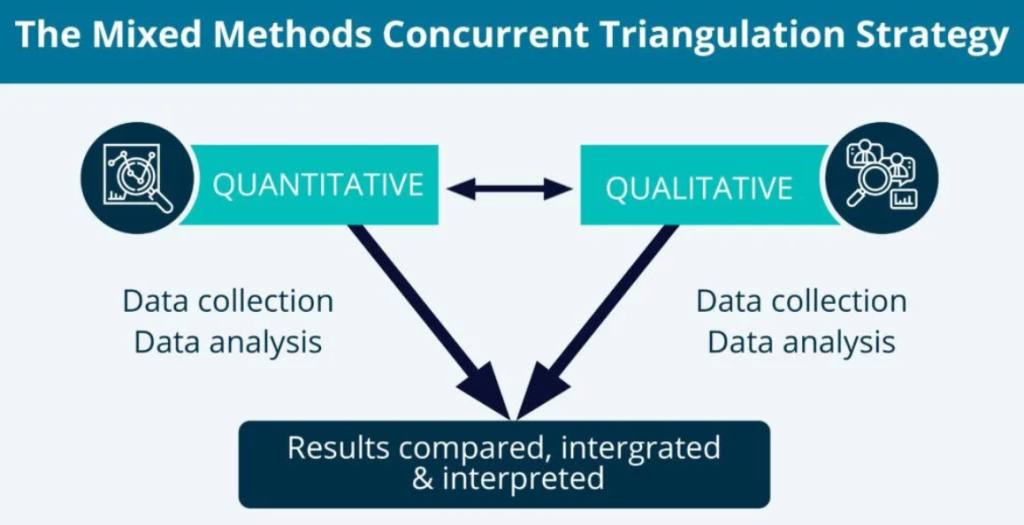
Table of Contents
The dissertation methodology chapter is the heart of your research, providing a clear and detailed blueprint for your study. It outlines the approach you will take to answer your research question, demonstrating the rigor and validity of your findings. This chapter serves as a roadmap for your readers, guiding them through the logical progression of your research and ensuring transparency in your methods. Writing a stellar dissertation methodology chapter requires meticulous planning, clear articulation, and a deep understanding of your chosen research approach.
This article offers a comprehensive guide to writing a robust and impactful dissertation methodology chapter.
Step-by-Step Guide to Crafting the Dissertation Methodology Chapter
1. Laying the Foundation: Research Paradigm and Design
Before embarking on the specifics of your dissertation methodology chapter, it’s crucial to establish a strong foundation by clearly defining your research paradigm and design.
- Research Paradigm: This refers to the philosophical assumptions that underpin your research. Common paradigms include positivism, interpretivism, and constructivism. Each paradigm dictates the nature of knowledge, the role of the researcher, and the methods deemed appropriate for inquiry. Explicitly stating your research paradigm provides a framework for understanding the choices you’ve made in your dissertation methodology chapter.
- Research Design: This refers to the overall structure and strategy of your research. Common designs include experimental, quasi-experimental, correlational, descriptive, and qualitative. The choice of design depends on your research question, the nature of your variables, and the level of control you have over your data. Clearly outlining your chosen research design helps readers understand how you will collect and analyze data to answer your research question.

2. Diving into the Details: Methods and Procedures
Once your research paradigm and design are established, it’s time to delve into the specifics of your chosen methods. This section should provide a comprehensive explanation of how you will collect and analyze your data.
- Data Collection Methods: This section should describe the specific techniques used to gather data relevant to your research question. Common methods include surveys, interviews, focus groups, observations, document analysis, and experiments. Clearly explain each method, outlining the instruments used, the sampling procedures, and any ethical considerations involved.
- Data Analysis Methods: Once you have collected your data, you need to analyze it to extract meaningful insights and answer your research question. This section should describe the specific techniques used for data analysis, including statistical analysis, thematic analysis, discourse analysis, or content analysis. Provide sufficient detail for readers to understand how you will interpret and draw conclusions from your data.
3. The Importance of Rigor and Reliability
A stellar dissertation methodology chapter goes beyond simply describing your methods. It also demonstrates the rigor and reliability of your research design.
- Validity: This refers to the extent to which your research measures what it claims to measure. You should address the different types of validity, such as internal validity (the extent to which changes in the dependent variable can be attributed to changes in the independent variable), external validity (the extent to which the findings can be generalized to other populations and settings), and construct validity (the extent to which the measures used truly reflect the constructs being studied).
- Reliability: This refers to the consistency and stability of your research findings. Address the different types of reliability, such as test-retest reliability (the consistency of results over time), inter-rater reliability (the consistency of results across different observers), and internal consistency (the consistency of items within a measure).
- Ethical Considerations: Addressing ethical considerations is crucial in any research, especially when working with human subjects. Discuss the measures you have taken to ensure the safety, privacy, and well-being of participants. This might include obtaining informed consent, protecting confidentiality, and minimizing potential harm.
4. The Role of the Literature Review in Your Dissertation Methodology Chapter
The dissertation methodology chapter is not merely a technical description of your methods. It should be woven seamlessly into the broader context of your research and contribute to the overall narrative. This is where the literature review plays a crucial role.
- Justifying Your Choices: By referencing relevant literature, you can provide a rationale for your chosen research paradigm, design, methods, and data analysis techniques. This demonstrates that your approach is grounded in established research practices and that you have considered alternative approaches.
- Addressing Limitations: The literature review can also help identify potential limitations of your study. Acknowledge these limitations and discuss how they may impact the interpretation of your findings. This demonstrates your awareness of the study’s scope and strengthens the credibility of your research.

5. Writing Style and Structure of Your Dissertation Methodology Chapter
Writing a clear and concise dissertation methodology chapter is critical for engaging your audience.
- Clarity and Conciseness: Use clear and concise language to avoid confusing your readers. Ensure each section flows logically, building upon previous points and leading towards a comprehensive understanding of your research approach.
- Structured Format: Organize your dissertation methodology chapter with clear headings and subheadings. This enhances readability and allows readers to easily navigate the different sections.
- Avoid Redundancy: Avoid unnecessary repetition of information already provided in other sections of your dissertation. Ensure that each section contributes unique insights and that there is a clear flow of information throughout the chapter.
6. Mistakes to Avoid in Your Dissertation Methodology Chapter
While writing a stellar dissertation methodology chapter requires a considerable amount of effort, there are common pitfalls that can derail your efforts.
- Lack of Clarity and Detail: Failing to provide sufficient detail about your research design and methods can leave readers with unanswered questions and undermine the credibility of your research.
- Weak Justification for Choices: Simply stating your chosen methods without providing a rationale for their selection can make your dissertation methodology chapter seem arbitrary and unconvincing.
- Ignoring Limitations: Every study has limitations, and acknowledging these limitations demonstrates your critical thinking skills and helps readers understand the scope of your findings.
- Poor Writing Style: Using jargon, vague language, or an overly technical writing style can alienate your readers and make your dissertation methodology chapter difficult to understand.
7. Refining and Polishing Your Dissertation Methodology Chapter
Once you have completed a draft of your dissertation methodology chapter, it’s important to revisit it with a critical eye and refine it to perfection.
- Seek Feedback: Share your draft with your advisor, peers, or colleagues and solicit their feedback. They can provide valuable insights and help you identify areas for improvement.
- Revise and Edit: Carefully revise and edit your draft to ensure clarity, conciseness, and accuracy. Pay attention to grammar, spelling, and punctuation.
- Final Proofread: Before submitting your dissertation methodology chapter, proofread it thoroughly to catch any remaining errors.
Common Pitfalls in the Dissertation Methodology Chapter and How to Avoid Them
The dissertation methodology chapter is the backbone of your research, outlining the strategies and techniques employed to answer your research questions. While crucial, this chapter is often riddled with pitfalls that can derail your entire dissertation. Understanding these common errors and implementing preventative measures is essential for ensuring a robust and defendable methodology.
Pitfall 1: Lack of Clarity and Justification:
The dissertation methodology chapter should be crystal clear in its explanation of the chosen research methods. Avoid vague statements and ensure every methodological choice is explicitly justified. Why did you opt for this specific data collection method? How does it align with your research question? Failing to provide convincing rationale weakens the foundation of your research.
Pitfall 2: Ignoring Ethical Considerations:
Ethical issues are paramount in research, and the dissertation methodology chapter should address them comprehensively. Clearly state how you obtained informed consent, ensured participant anonymity, and minimized potential risks. Ignoring ethical implications can jeopardize the validity of your research and lead to serious consequences.
Pitfall 3: Overlooking the Limitations:
No research method is perfect. The dissertation methodology chapter should acknowledge the limitations of your chosen methods, outlining potential biases, constraints, and areas for improvement. This honesty demonstrates a critical understanding of your research and its implications.
Pitfall 4: Weak Data Analysis Strategy:
Simply collecting data is insufficient. The dissertation methodology chapter must clearly outline your data analysis approach. What specific software or techniques will you employ? How will you interpret the findings and draw conclusions? A well-defined analysis strategy ensures the reliability and validity of your results.
Pitfall 5: Lack of Connection to Research Question:
The dissertation methodology chapter should be intrinsically linked to your research question. Every methodological choice should directly contribute to answering your question. Failing to establish this clear connection weakens the overall coherence and purpose of your research.
How to Avoid These Pitfalls:
- Thorough Planning: Begin by meticulously planning your research design, carefully considering various methodological options.
- Literature Review: Analyze relevant research articles to identify the most appropriate methods for your topic.
- Consult with Experts: Seek guidance from professors, mentors, and research advisors to refine your methodology and identify potential pitfalls.
- Pilot Testing: Conduct pilot studies to refine your data collection instruments and ensure their effectiveness.
- Peer Review: Share your dissertation methodology chapter with colleagues or fellow students for feedback and suggestions.
- Revise and Refine: Be willing to revise and refine your dissertation methodology chapter based on feedback and new insights gained during the research process.

The dissertation methodology chapter is a cornerstone of your academic journey. By diligently addressing the common pitfalls and implementing preventative measures, you can create a robust and defensible methodology that contributes to a rigorous and impactful dissertation.
Frequently Asked Questions about the Dissertation Methodology Chapter
The dissertation methodology chapter is often a source of anxiety for students. It’s the heart of your research, outlining how you will answer your research questions. This chapter is crucial, not only for demonstrating your understanding of research methods but also for establishing the credibility and validity of your findings. To alleviate some of the pressure, let’s explore some common questions about this critical component of your dissertation:
1. What exactly is the purpose of the dissertation methodology chapter?
Think of the dissertation methodology chapter as a detailed road map for your research journey. It explains how you will collect and analyze data to answer your research questions. This chapter is not just about describing the methods you will use, but also about justifying why these methods are appropriate for your specific study. It needs to convince the reader that your chosen approach is the most effective way to address your research problem.
2. What are the essential elements of a dissertation methodology chapter?
A strong dissertation methodology chapter typically includes the following components:
- Research Design: Describe the overall approach you’re taking (e.g., qualitative, quantitative, mixed methods). Explain why this design is the most appropriate for your research.
- Participants/Sampling: Clearly define your study population and explain how you will select participants. Provide details on the characteristics of your sample and the rationale behind your sampling method.
- Data Collection Methods: Describe the specific methods you will use to gather data (e.g., surveys, interviews, experiments, observations). Explain how these methods relate to your research questions and provide details about the instruments you will use.
- Data Analysis Techniques: Clearly outline the steps you will take to analyze the collected data. This might involve statistical analysis, thematic analysis, or other appropriate techniques.
- Ethical Considerations: Address any potential ethical issues related to your research, including informed consent, confidentiality, and data security.
- Limitations: Acknowledge any potential limitations of your chosen methodology and discuss their impact on your findings.
3. How do I choose the right research design for my dissertation?
The choice of research design depends heavily on your research questions and the type of data you need to collect.
- Quantitative research uses numerical data and statistical analysis to test hypotheses and draw conclusions. This approach is suitable for studying large-scale phenomena or identifying patterns and trends.
- Qualitative research focuses on understanding the experiences and perspectives of individuals or groups. It uses textual data like interviews, observations, and documents for analysis. This approach is particularly helpful for exploring complex social phenomena, understanding lived experiences, or developing theory.
- Mixed methods research combines both quantitative and qualitative approaches. This approach offers a more comprehensive understanding of a research topic by integrating different types of data and analysis.

4. How do I write a clear and concise dissertation methodology chapter?
Crafting a compelling dissertation methodology chapter involves careful planning and writing:
- Start with a clear outline: Define the main sections and subsections of your chapter before you start writing. This will ensure a logical flow and prevent unnecessary repetition.
- Use plain and concise language: Avoid jargon and complex vocabulary that might confuse the reader. Focus on clear and straightforward language that effectively conveys your ideas.
- Provide sufficient detail: Ensure you provide enough information about each element of your methodology to allow the reader to understand and evaluate your approach.
- Use relevant literature: Cite appropriate literature to support your methodological choices and demonstrate your understanding of established research practices.
5. How do I deal with challenges and limitations in my dissertation methodology?
Every research project has limitations. Be honest and transparent about these limitations in your dissertation methodology chapter. Discuss how they might influence your findings and explain any measures you’ve taken to minimize their impact. For instance, if you’re using a small sample size, acknowledge its potential impact on the generalizability of your findings.
6. How can I ensure my dissertation methodology chapter is strong and convincing?
To strengthen your dissertation methodology chapter, consider the following:
- Consult with your supervisor: Regularly seek feedback from your supervisor to ensure your approach is aligned with your research questions and meets the requirements of your field.
- Review existing literature: Familiarize yourself with established research methods and consider adopting methods that are widely accepted and effective in your area of study.
- Get feedback from peers: Share your chapter with fellow students or colleagues for constructive feedback and suggestions.
- Revise and refine your work: Take the time to carefully revise and edit your chapter to ensure clarity, coherence, and accuracy.
The dissertation methodology chapter is a crucial element of your dissertation, demonstrating your ability to design and execute rigorous research. By approaching this chapter with care and understanding, you can create a strong foundation for your dissertation and ensure the credibility and validity of your findings. Remember to seek guidance from your supervisor and peers, and don’t hesitate to ask for help when needed. With careful planning, diligent effort, and a clear understanding of the core principles of research methodology, you can write a strong and convincing dissertation methodology chapter that effectively communicates your research approach and strengthens your dissertation as a whole.
The Importance of a Stellar Dissertation Methodology Chapter
The dissertation methodology chapter is a crucial component of your dissertation, providing a foundation for understanding your research approach, establishing the rigor and reliability of your findings, and demonstrating your mastery of research methods. By carefully crafting a clear, concise, and well-supported dissertation methodology chapter, you can contribute to the advancement of knowledge in your field and leave a lasting impression on your readers.
Remember: Your dissertation methodology chapter is not merely a technical exercise but an opportunity to showcase your intellectual rigor, critical thinking skills, and ability to conduct high-quality research. By following these guidelines, you can craft a stellar dissertation methodology chapter that will make a significant contribution to your dissertation as a whole.
Get Professional Dissertation Writing Help
At PhD Nurse Writer, we are the experts that you should always engage when seeking help with dissertations. We can assist you with choosing a compelling topic, dissertation writing, proofreading, editing, formatting and plagiarism removal. Besides, our experienced writers can also help you with writing authentic essays, research papers and case studies.





